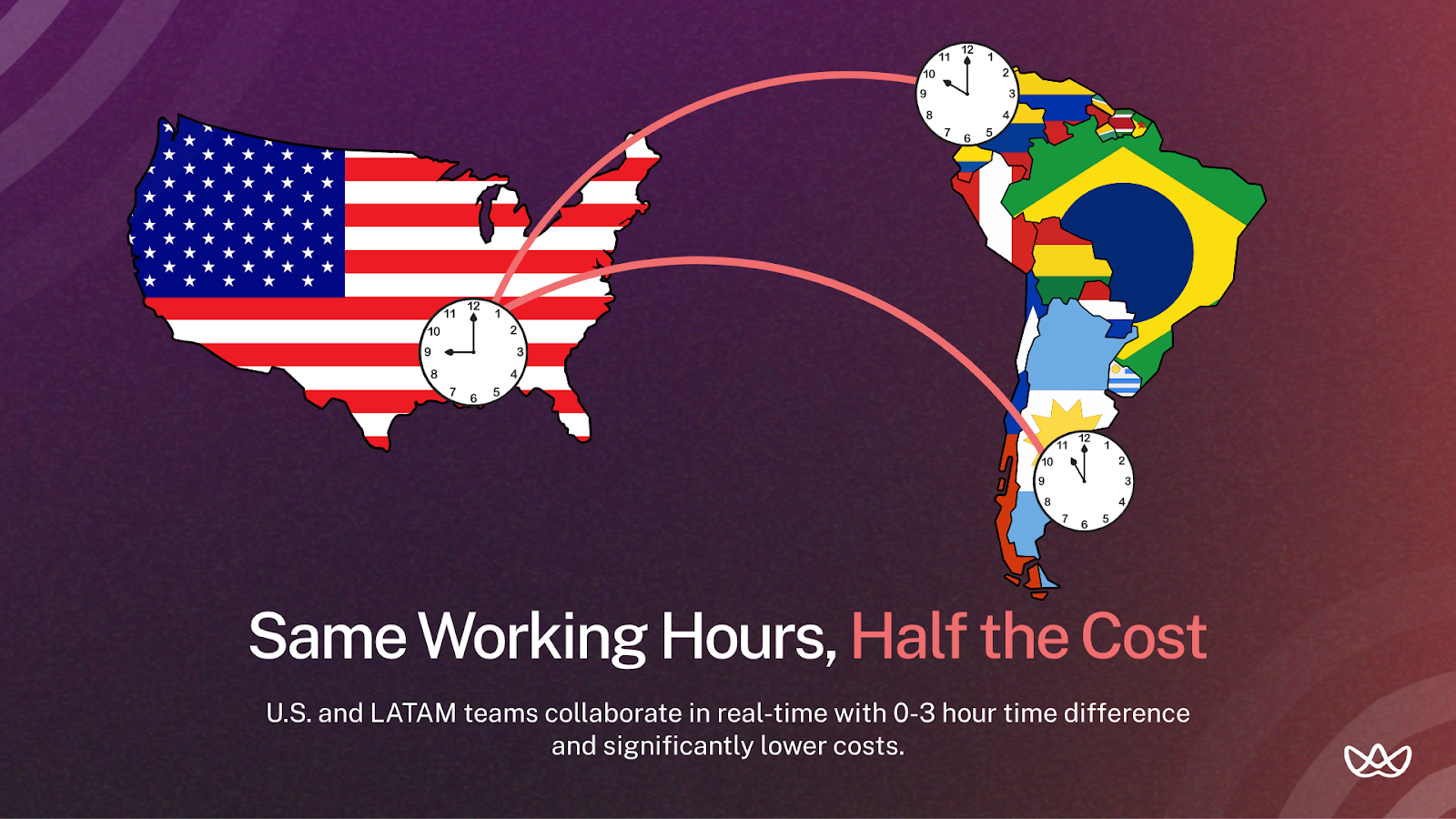If you’re looking at building remote teams this year, Latin America is where the talent is.You get professionals who speak English well, work in U.S.-friendly time zones, and deliver output on par with local hires.
Salaries are typically 50-60% lower than what you’d pay in the U.S., but the quality doesn’t drop. Mexico, Colombia, and Argentina stand out for marketing, design, and tech roles.
With vetted networks or an EOR, you can bring people on board quickly and stay fully compliant across multiple countries, without adding complexity to your operations.
Let’s see why LATAM has become a top hiring region for U.S. companies and how to hire the best professionals across it.
Why LATAM Talent Is Rising in 2026:
Why U.S. Companies Are Hiring LATAM Talent in 2026

1. Access to Skilled, Bilingual Professionals
Across LATAM, the talent pool has matured fast. You’ll find marketers, designers, project managers, and analysts who’ve worked with U.S. clients for years and handle English naturally.
In cities like Bogotá, Buenos Aires, and Mexico City, it’s normal for professionals to switch between English and Spanish during calls. For U.S. teams, that means no lag in communication or translation gaps, just clear collaboration from day one.
2. Time Zone Alignment and Real-Time Collaboration
The time zone match is one of the simplest but most important advantages. A team in Mexico City or Medellín works the same hours as teams in Austin or Miami. You can run daily standups, give feedback, and close loops in the same workday.
That’s harder to do with teams 10 hours ahead or behind. When work depends on real-time feedback - marketing campaigns, client work, or creative projects, being in sync saves much of your time.
3. Competitive Costs Without Sacrificing Quality
Hiring in LATAM cuts labor costs by about half compared with U.S. salaries. A mid-level marketing manager or operations lead earns roughly $2,500-$3,000 a month, while similar roles in the U.S. often start around $6,000.
It’s not about underpaying - it’s about different economies. In most LATAM cities, that income supports a strong middle-class lifestyle. The value comes from cost alignment, not compromise.
4. Strong Cultural Fit and High Retention
Culture fit is another reason U.S. teams keep hiring in the region. The work ethic, communication style, and expectations are familiar. People show up on time, take feedback directly, and treat deadlines seriously. That makes integration easier than in many offshore setups.
Floowi’s data shows LATAM professionals tend to stay longer in roles compared with hires in other regions. Less turnover means teams can grow without constantly retraining or backfilling positions.
Why LATAM Talent Outperforms Other Regions
LATAM offers the best combination of cost, communication, and collaboration for U.S. companies.
Eastern Europe has strong technical and language skills, but salaries there have risen sharply. In Poland and Romania, some roles now cost close to U.S. rates, and ongoing regional instability adds uncertainty.
Asia remains the lowest-cost option, but the time zone gap and uneven English proficiency often limit real-time teamwork. For roles that rely on quick feedback or client interaction, that delay can outweigh the savings.
Top 5 LATAM Countries to Hire Remote Talent in 2026
Mexico is the main choice for customer-facing roles. Sales, account management, and customer success professionals often have experience with U.S. teams and speak English fluently.
Colombia is known for creative talent. Bogotá and Medellín produce designers, writers, and video editors, making it possible to staff a full creative team locally.
Argentina offers technical expertise. Buenos Aires has developers and engineers with solid math and science foundations and experience on international projects.
Chile provides management and analytical skills. Professionals with backgrounds in strategy, data, and enterprise systems are readily available.
Peru is cost-effective for operational support. Administrative and support roles are more affordable while maintaining consistent quality.
How to Hire LATAM Talent Effectively (Step-by-Step)

1. Define role requirements and expectations
Write a clear job description that outlines responsibilities, required skills, and success metrics.
Be specific about English proficiency requirements. "Conversational English" means something different than "business fluent" or "native-level writing ability."
2. Benchmark salary by country
Use Deel's salary data or Floowi's compensation benchmarks to set realistic pay ranges.
Don't lowball. Competitive salaries attract better candidates and reduce turnover. A $500 monthly difference can mean the gap between a mid-level and senior hire.
3. Choose a hiring model
You can hire directly, through an Employer of Record, or with a nearshore agency. EORs handle payroll and compliance, agencies can manage sourcing and some HR tasks, and direct hiring gives you control but requires managing contracts and labor rules yourself.
The choice depends on your team’s capacity and how quickly you need the role filled.
4. Partner with a vetted LATAM talent network
Skip the job boards. Through Floowi's nearshore hiring model, U.S. companies can hire full-time LATAM talent in under 15 days.
Pre-vetted networks save weeks of screening unqualified candidates.
5. Screen for English and cultural fit
Use video interviews to observe how the candidate communicates in real time. Ask about past projects or how they handled deadlines to understand their approach to work and collaboration.
Written English alone doesn’t always show how someone performs in meetings or day-to-day tasks.
6. Onboard with KPIs and tools
Set clear performance expectations from day one. Provide access to the same tools your U.S. team uses.
Slack, Asana, Figma - whatever your stack is, get them set up immediately. Delayed access creates frustration and signals disorganization.
EOR vs Nearshore Agency vs Direct Hiring in LATAM
An Employer of Record (EOR) is the registered employer in the country where you hire. They handle payroll, social security, taxes, benefits, and compliance with local labor laws. You assign and manage the professional’s work, but the EOR manages the employment contract and obligations. This is useful if you want to hire quickly without setting up a legal entity.
A nearshore agency recruits, screens, and onboards candidates. Some also manage payroll or partner with an EOR. Pre-vetted candidates save time, though the service comes at a cost.
Direct hiring requires a local entity, managing payroll, taxes, and compliance yourself. It makes sense for larger teams or long-term operations.
Using an EOR or agency takes care of payroll and compliance so you can focus on managing your team and the work itself.
LATAM Salary & Benefits Benchmarks (2026)
The table below shows typical salaries for mid-level positions in LATAM, with 3-5 years of experience. Junior roles are usually 30-40% lower, while senior professionals with 7+ years can earn 40-50% more.
Currency fluctuations affect these numbers. Argentina's peso has been unstable, which means dollar-based salaries become more attractive to Argentine workers. Mexico's peso remains relatively stable, keeping compensation predictable.
Common LATAM Benefits
Most benefits in LATAM are legally required, so it’s important to account for them.
Health coverage is mandatory, with contributions shared between employee and employer (EPS in Colombia, IMSS in Mexico). Private insurance is optional but common for professional roles.
13th-month salary is standard across the region. It’s a year-end payment equal to one month’s salary, usually paid in December, and should be included in budget planning.
Holidays and vacation usually include 10-15 national holidays and 15-20 vacation days per year, with some countries like Brazil requiring more.
Flexible schedules are common. Many professionals expect remote or hybrid work, and flexibility often influences hiring decisions.
Legal, Tax & Compliance Essentials in LATAM
Labor Laws, Contracts & Payroll
Misclassifying professionals is a common issue. In LATAM, countries have specific rules to distinguish employees from independent contractors. If you misclassify someone, you could be liable for back taxes, penalties, and legal fees.
In Mexico, if you control how and when someone works, they are likely considered an employee regardless of the contract. Colombia has similar standards, and Brazil is even stricter. Payroll taxes vary: Mexico’s employer contribution is around 30% of salary, while
Argentina can reach 40%. Severance obligations also differ: Mexico requires three months’ salary for termination without cause, and Colombia calculates it based on tenure. These are legal requirements, not optional costs.
IP Protection and Data Security
Contracts should include IP assignment clauses to ensure work produced belongs to your company. Data protection is important:
Brazil’s LGPD is similar to GDPR, and Mexico and Argentina have their own frameworks.
Include confidentiality and security clauses if employees handle sensitive data.
How EORs Simplify Compliance Across Multiple LATAM Countries
Managing payroll, taxes, benefits, and labor laws across multiple countries can quickly become complex. EORs consolidate this work, handling local compliance, updating contracts when laws change, and filing taxes.
This allows you to focus on directing the professional’s work without managing every legal detail yourself.
Retention Strategies for Managing Remote LATAM Talent
1. Build a Connected, Cross-Border Culture
Time zones in LATAM align closely with the U.S., which makes scheduling live meetings possible. Weekly video standups can work better than relying only on messaging.
Team rituals, even small ones, help maintain connection. Some companies run monthly virtual pairings or quarterly in-person meetups in a central city.
Clear communication expectations: response times, meeting participation, and how to raise blockers - reduce uncertainty and make collaboration smoother.
2. Invest in Upskilling and Career Development
Providing professional development helps retain staff. Budgeting for online courses, certifications, or conference participation signals investment in their growth.
Certifications like Google Analytics, HubSpot, Meta Blueprint, or AWS carry value in LATAM and help employees advance.
Mentorship programs pairing senior U.S. team members with LATAM hires also transfer knowledge and align work standards.
3. Maintain Transparent Feedback and Growth Paths
Regular performance discussions are essential. Monthly check-ins with clear feedback help employees understand expectations.
Growth paths should be explicit: what skills or responsibilities are required to move to the next level.
Salary reviews should occur at least annually to reflect performance and cost-of-living changes.
4. Build Career Paths and Leadership Pipelines
Hiring individual contributors is just the start. Promote high-performing team members into team lead or manager roles.
For example, a Head of Design in Colombia can manage a local team and oversee projects, providing leadership at a lower operational cost than a U.S.-based equivalent.
Defining clear advancement paths helps retain staff and integrates LATAM employees into your team consistently.
Getting Started
You can hire bilingual, experienced LATAM professionals without affecting quality or collaboration. Using EORs, nearshore agencies, or pre-vetted talent networks helps you hire faster, stay compliant, and scale teams in a manageable way.
Start building your team with top nearshore LATAM talent through Floowi. Book your free consultation today.
Frequently Asked Questions
Why is LATAM more attractive than Asia for U.S. remote hiring?
LATAM aligns closely with U.S. time zones, usually 0-3 hours apart, which allows real-time collaboration. English proficiency is generally strong, and cultural similarities make communication smoother.
Which LATAM country offers the best English-speaking professionals?
Mexico and Colombia are the strongest for client-facing roles, with clear English communication. Argentina also ranks high, especially for technical roles where English documentation is standard.
What are the most in-demand roles among LATAM professionals in 2026?
SEO specialists, graphic designers, full-stack developers, and digital marketers are the most requested. Customer success and sales positions are also growing.
How much can U.S. companies save by hiring in LATAM?
Salaries are typically 50-70% lower than U.S. equivalents. For example, a role costing $80,000 in the U.S. might run $24,000–$40,000 in LATAM for similar skills.
What’s the typical hiring timeline for LATAM roles?
With pre-vetted networks, hiring can take around 10–15 days. Direct hiring through job boards can take 6-8 weeks.
When should I use an EOR instead of a nearshore agency?
EORs are suitable for long-term hires or compliance-heavy roles where you don’t want to set up a local legal entity. Agencies are helpful when you need recruitment support alongside compliance.
Do salaries vary significantly between LATAM countries?
Yes. Argentina and Chile tend to be 20-30% higher than Colombia or Peru for similar roles, while Mexico is in between. In some cases, specialization affects pay more than geography.
Can I manage compliance easily when hiring across multiple countries?
EORs simplify this by centralizing payroll and compliance. Managing multiple countries independently is complex, but an EOR handles local rules while you maintain one relationship.
How does Floowi simplify hiring across LATAM?
Floowi manages vetting, contracts, and payroll, giving access to pre-screened marketing, creative, and technical professionals. This allows you to scale teams quickly without handling every compliance detail yourself.


.png)
.png)









